Easy Egg Free Baby Led Weaning Recipes and Ideas
Table of Contents
What do we know about egg-free diets?
Egg-free diets are becoming increasingly popular due to allergies, dietary preferences, or ethical reasons, from 6 months of age.
Eggs are a common allergen, with symptoms ranging from mild itching to life-threatening anaphylaxis. Those following egg-free diets must be diligent about reading food labels, as eggs can be present in unexpected products like baked goods, sauces, and dressings.
Despite being a rich source of protein and nutrients, eggs can be replaced in recipes with alternatives such as flax or chia seeds, applesauce, or commercial egg replacers.
Consulting with a healthcare provider or dietitian is recommended to ensure essential nutrients are not lacking when eliminating eggs from the diet.
The Pros and Cons of Egg-Free Diets
When it comes to introducing solids during baby led weaning, many parents deliberate over whether to include eggs in their child's diet. Eggs are a common allergen, and some parents opt for an egg-free approach to be cautious.
Here are some pros and cons to consider when deciding on egg-free diets during baby led weaning:
Pros:
Allergy Prevention: By avoiding eggs during the early stages of weaning, parents can reduce the risk of developing an egg allergy in their child. Introducing potential allergens too early can sometimes lead to sensitivities later in life.
Simplicity: Eliminating eggs from the baby’s diet can simplify meal planning and preparation, especially for parents who may have concerns about allergies or want to err on the side of caution.
Exploration of Other Foods: Going egg-free encourages parents to explore a wider variety of foods and ingredients when preparing meals for their baby, promoting a more diverse and balanced diet.
Cons:
Nutrient Deficiency: Eggs are a rich source of various essential nutrients, including protein, vitamin D, and choline. By excluding eggs from the diet, there is a risk of missing out on these vital nutrients that are important for a baby's growth and development.
Limited Food Choices: Eggs are versatile and can be incorporated into many recipes, providing texture and flavor to meals. Excluding eggs may limit the variety of foods available to the baby, potentially leading to a less diverse diet.
Social Impact: As the baby grows older, being on an egg-free diet may present challenges in social settings, such as birthday parties or family gatherings, where eggs are commonly used in cooking and baking.
In conclusion, the decision to follow an egg-free diet during baby led weaning is a personal one that should consider the child's health, family history of allergies, and nutritional needs.
Consulting with a paediatrician or a nutritionist can provide valuable guidance in making an informed choice tailored to the baby's individual requirements.
Egg-free Breakfasts
When it comes to introducing solid foods to little ones through baby-led weaning, finding nutritious and tasty options that are free of common allergens like eggs can be a top priority for many parents. Luckily, there are plenty of delicious alternatives that can make for a satisfying breakfast for your baby.
Fruit Purees: Starting the day with a colourful array of fruit purees can be a great way to kick off breakfast. Think ripe bananas, sweet mangos, juicy berries, or creamy avocados. These options not only provide essential vitamins and minerals but also introduce your baby to a variety of flavours and textures.
Oatmeal: A warm bowl of oatmeal can be a comforting and filling breakfast choice. Cooked to a soft consistency, oats can be easily picked up and explored by tiny hands, great options for baby. To add more flavour and nutrition, consider mixing in mashed fruits like apples or pears, a sprinkle of cinnamon, or a dollop of yogurt.
Chia Seed Pudding: Chia seeds are packed with fibre, omega-3 fatty acids, and protein, making them a fantastic addition to your baby's breakfast menu. By soaking chia seeds in milk or a dairy-free alternative overnight, you can create a chia seed pudding-like texture that is both fun to eat and nutritious.
Sweet Potato Pancakes: Swap out traditional pancake ingredients with mashed sweet potatoes for a unique and wholesome breakfast option. You can customize these pancakes by adding a touch of cinnamon or nutmeg for added flavour. Serve them in small, easy-to-hold pieces for your baby to enjoy.
By exploring these egg-free breakfast ideas, you can kickstart your baby's day with a nutritious and delightful meal that supports their growing independence and palate through baby-led weaning.
Take a look through my breakfast easy recipes and give them a go!
Cottage cheese and strawberries cup recipe is a great make-ahead on-the-go breakfast or snack for baby. Packed with protein this can be a complete meal option.
A delicious 2 ingredient prune puree recipe for baby food and baby led weaning. A great way to introduce new flavours to your baby and their taste buds.
This baked apple recipe is a fun way to serve apple to baby. Using lots of different ingredients to make the apple slices look fun and inviting to baby.
This is a great 3 ingredient millet porridge recipe - ready in 10 minutes. Start the day with a nutritious breakfast that can feed baby from 6 months old.
This is a yummy and quick smoothie recipe with yogurt, peanut butter and banana and can be served in a cup for older kids or a bowl with a spoon for babies.
This pureed rhubarb fool recipe is an easy make ahead breakfast on the go or yummy dessert for baby, toddler and the adults too! Good intro to a seasonal fruit.
Applesauce fritters are an excellent finger food option for baby-led weaning as they are soft, easily manageable, and packed with flavour. Try for breakfast!
These blackberry oat bars are a great, quick breakfast for baby-led weaning, picky eaters and older kids. Packed with simple ingredients and natural sweetness.
These Weetabix bites are a great baby-led weaning finger food recipe. With just 2 ingredients they are quick and easy to whip up for a snack or breakfast idea.
A great way to add more fruit to your baby or toddler's diet. A fruit smoothie bowl can be made with frozen fruit to give a creamier and thick texture.
This Weetabix and banana pudding combines two popular ingredients for a baby led weaning option. An easy make ahead breakfast recipe for those busy mornings!
Introducing my home made no-sugar granola powder made with oats, rye flakes, nuts and seeds. A great breakfast idea that is delicious for the whole family.
An easy nutritious porridge recipe suitable from 6 months old that combines quinoa and oats . This porridge is gluten-free, easy to digest and simple to prepare
This breakfast bar is similar to a porridge oats bar but without using eggs and no added banana. Perfect finger food for BLW and packed with quinoa protein.
This healthy buckwheat pancakes recipe, free from added sugar and egg, provides a wholesome and nutritious quick breakfast without compromising on taste.
My apple fritters (similar to an apple pancake) are made with ground oats, grated apple, cinnamon (can be left out), and oat milk, with no added sugar.
Apple Cinnamon Butter Toast! Next level recipe! An easy recipe created with the health-conscious parent and their budding food explorer in mind, this delicious BLW (Baby-Led Weaning) option is bound to satisfy tiny taste buds while keeping added sugars at bay.
Homemade baked beans are not difficult to make. I have used haricot beans in a tangy tomato-based sauce. They are a great source of protein and fibre.
This healthy banana split is a colourful and flavourful twist on a classic dessert. Serve with yogurt, berries and peanut butter. Suitable from 6 months old.
A yummy make-ahead chia seed pudding recipe for breakfast or a healthy snack. This amazing superfood is the perfect option for your little one's growing needs.
An easy make ahead breakfast recipe for your weaning baby or toddler that is deliciously creamy and sweet as well as being a nutritious breakfast option.
Does a BBQ baked banana bring back memories for you too? This is such a healthy snack or dessert that can be served with coconut, strawberries and more!
Potato cakes are so versatile, they can be eaten as part of a breakfast, lunch or even dinner! This is a fun recipe for potato cakes shaped as bunnies making them extra special for your little ones!
Baby food breakfast: An overnight wheat biscuits recipe - a delicious, yummy and sweet breakfast for a quick organised start to the day with your little one!
Healthy breakfast: If you’re always in a hurry in the morning, give this porridge recipe a try! Best prepared the night before ready to heat for breakfast.
Egg Free Lunches and Dinners: Fun for Babies and Toddlers!
Why not give one of my lunch or dinner recipes a go?
This quesadilla veggie recipe is a great quick lunch or dinner idea perfect for baby and and toddler. The recipe is very easy to make vegan and dairy free.
A simple homemade mashed potato recipe that is perfect for baby and toddler. A quick and easy side dish that can be served alongside lots of yummy recipes.
Breadsticks and cheese are a great idea for or snack or lunch and can be served to baby and toddler. Mix it up with some veggie sticks or houmous dip.
A creamy cream cheese and tuna dip recipe that can be made in a hurry. It's a great holiday recipe that the whole family can enjoy together from 6 months old.
This avocado cottage cheese toast recipe is great for baby-led weaning and for Mummy too. Can be easily adapted to make a gluten and dairy free versions.
This tortilla pizza roll up recipe is a really quick and simple meal idea for baby-led weaning. Prepared quickly so save this one for when time is pressing.
Turn your Christmas day leftovers into a hearty turkey cottage pie. An easy recipe for the festive period. Suitable for the whole family from 6 months old.
This is a great way to use up leftover turkey from your Christmas roast dinner. A lovely way to use up the meat and include your baby within the festive food.
A yummy turkey lasagne recipe for baby led weaning and the whole family of course. A great way to use up leftover turkey from the Christmas Roast dinner.
This is a great, quick and easy meal idea for baby led weaning. The toast recipe and toppings can be rustled up in a matter of minutes, great for busy parents!
This avocado and cottage cheese dip is a quick recipe for baby and the whole family to enjoy. Dip or spread on toast for a delicious snack or nutritious lunch.
This is such a simple and quick recipe for baby and toddler for a quick and easy lunch idea! Only three ingredients needed for my bagel grilled cheese recipe!
This baby-friendly fried version of a peanut butter and jelly sandwich is a perfect introduction to solid foods for little ones practising baby-led weaning.
This is a very quick curry recipe using leftover cooked chicken. A fun way to serve a curry to your baby from 6 months old. Great for the whole family too!
This is a delicious sweet potato pizza base that uses just a handful of store cupboard ingredients. A great recipe for baby-led weaning and older kids too.
My parsnip puree recipe is a great option for babies and toddlers. You can customise by adding different fruit and veggies to make a yummy meal for baby.
This is a really easy cheesy, cheese sauce to make for baby and the whole family too! You can also easily make the recipe dairy free with a few swaps.
A yummy homemade breadstick recipe that is perfect for baby and toddler. Soft and doughy, they can be used for dipping and great for picnics and lunch boxes.
This is a yummy, quick and easy creamy coconut milk pasta with tomato pasta recipe for baby and toddler. A great vegetarian that the whole family can enjoy.
This is a great 2-ingredient for a Greek yogurt flatbread recipe - can be made in a flash. They are a great alternative to bread and can be dipped and wrapped.
This really is an easy bread recipe - great if you want to have a try at making your own bread only using two ingredients - just bread flour and yogurt.
This pizza croissant roll stuffed with cheese recipe is a quick and fun idea, perhaps for an after school snack or as part of a main meal at dinner time.
This is actually a vegan kidney bean curry recipe is perfect for baby, toddler and the whole family too. A great plant based/dairy free dinner or lunch.
This lentil patty recipe is a great way to serve soft, easy to digest lentils to baby for baby-led weaning. A great finger food option for baby and toddler.
This courgette puree recipe produces a great smooth puree that can be added alongside finger foods for dipping. Excellent for younger babies starting weaning.
This is an easy to prepare and cook lentil soup for a baby-led weaning lunch or dinner recipe. A great nutritious complete meal for the whole family too.
If you are looking to introduce chicken to your baby for the first time, try this yummy chicken drumstick recipe. Great for older babies and toddlers too!
These courgette fritters are the perfect finger food for baby-led weaning, easy for little hands. Packed with vitamins and minerals and high water content.
Simple crudites with a dip is a great veggie recipe for baby, toddler and the whole family. Requires minimal preparation and cooking time with fave veggies!
This is a great four ingredient tater tot recipe great as a finger food for baby or a yummy side for chicken nuggets or fish fingers. Baked not fried!
A cheese and ham croissant is so delicious and this recipe uses bread to look like a croissant! A fun lunch idea, ideal if you like a cheese and ham sandwich!
A simple recipe if your little ones like pizza! Use pitta bread instead of pizza dough, cheese of your choice and favourite finger food for the bento box.
This peanut butter and raspberry bento box recipe is really fun and includes a mini tortilla, instead of the usual bread option, and other favourites!
A quick and easy, fresh tasting lunch! Easy bento box idea for all the family using giant cous cous and Cheddar cheese! This makes one substantial bento box.
A fun way to serve pastry! The cheese puffs are so moreish and perfect served on their own, or if you prefer, serve with favourite fruit or veggies. Yum!
This is a great on-the-go, make-ahead lunch or snack recipe using butter beans that is sure to be a winner in your home! Serve with breadsticks and crudites.
A fun bento box recipe with banana and peanut butter that you can get your little ones involved making! Serve with fruit, cheese and even a little Greek yogurt.
If you need another fun lunch idea, this bento box is simple but so tasty! Peanut butter and cheese is a winning combination and one your little one will love!
A very easy bento box, inspiration taken from an old classic - coronation chicken - packed full of flavour for a lunch that can be enjoyed by all the family!
A great snack bento box for your weaning baby to keep going back to! All the elements are fun - great for introducing different textures, like the dragon fruit.
A fun, picky mozarello and tomato bento box lunch for you and your little ones! Full of flavour to waken those taste buds! This recipe makes 6 pastries.
This houmous roll bento box is a tasty sandwich lunch and visually appealing that will be a favourite with your little ones! Houmous used as a sandwich spread.
A delicious lunch for your little one! All the elements of their favourites with a twist on traditional pizza but in a bento box! Add in some fresh fruit.
A fun Easter bunny bento box recipe for your little one! Packs a punch with vitamins and minerals, all in a sandwich lunch! Quick, convenient and simple too!
A perfect finger food lunch recipe for your little ones! Make lunch time fun with this delicious pasta shell bento box! Serve large filled pasta shells as snack.
A delicious potato salad bento box that can be enjoyed by all the family! New potatoes, kidney beans, green beans and spring onion - packed with veggies!
A tasty chicken nacho bento box lunch recipe idea that will be a fun treat for your little one! A protein rich lunch that can be dipped into for lunch!
This must be my favourite pesto recipe that I have made deliciously dairy free! This is an ideal pesto pasta bento box for lunchtime for your little one!
A yummy plant-based black bean taco bento box lunch recipe using black beans and avocado that can be dipped, wrapped or rolled full of protein and yumminess!
Try making this fun dinosaur bento box for your little one. The separated food helps your baby to see clearly what foods are on the plate without touching.
This is a great, quick low sugar flapjack recipe with a peanut butter drizzle. They are so tasty and perfect for an after school snack for kids of all ages.
A quick way to serve strawberries when weaning your baby. An easy snack or dessert that will help with teething gums. Great for babies from 6 months old.
Just cottage cheese and oats rolled into balls - a great two ingredient finger food recipe for baby from 6 months old. Packed with protein and calcium.
This cornflake flapjack recipe is a lovely twist on the usual traditional flapjack recipe. Cornflakes combined with oats and yogurt. Great for baby and toddler!
These spiced gingerbread flapjacks are a great festive recipe that can be made all year round. Great for snacks, breakfasts on-the-go or add to the lunch box.
These strawberry Santa hats are a great little recipe for the festive season. Make for family parties or for the whole family to enjoy as a festive treat.
These strawberries and cream lollies are great for teething gums. With only two ingredients they are really easy and quick to make too. Homemade are the best!
This is a great way to use apple puree for baby-led weaning. The soft pastry and sweet apple puree is a great combination and a treat for the entire family.
This is a simple applesauce recipe to whip up in no time. It can be a great base for so many recipes such as a apple crumble or served on its own with yogurt.
These delicious strawberries and cream cookies are easy to prepare. They have a soft texture when baked. Perfect for lunch boxes and after school snacks.
This baked pears recipe is great for baby led weaning. Naturally soft and sweet when baked, they make a yummy snack or breakfast item. The cinnamon adds warmth.
My easy apple flapjacks is a great recipe for baby-led weaning. No added sugar just sweetened with apple puree and Greek yogurt. Great for older kids too.
Mmm, strawberries and cream! This is my fun take on the viral strawberries and cream sandwich slice. A tasty sweet treat for the whole family to enjoy!
A very simple ‘how to’ serve cucumber to baby during the baby led weaning journey, served with a yogurt dipping sauce and optionally, some flaxseed for texture.
This is a great recipe for teething gums or it can be a great option for a sweet treat for snack time
This is an easy sugar free ice lolly recipe for those hot summer days or just for a nice, cooling treat! Suitable for baby-led weaning and for older kids too.
This is a really easy three ingredient vegan flapjack recipe for baby-led weaning and toddlers. Uses plain vegan Greek yogurt instead of butter or eggs.
This Cheerios bars recipe is an easy no-bake 3 ingredient recipe for babies 12 months of age. The recipe is great for older kids too as an after school snack.
These no added sugar oatmeal cookies are great for baby-led weaning and toddler. Super finger food snack choice any time of the day, or easy breakfast option.
These carrot and courgette muffins are great for baby-led weaning and toddler. They have no added egg and are really easy to make dairy free and vegan.
These blackberry oat bars are a great, quick breakfast for baby-led weaning, picky eaters and older kids. Packed with simple ingredients and natural sweetness.
These are the best homemade cheesy puffs, a great alternative to store-bought alternatives. Almost melt in the mouth, so a good choice for baby led weaning.
Try this baby-led weaning recipe. Packed with protein and mashed berries, these cottage cheese fruit cups are a great snack or dessert for baby and toddler.
This is a great recipe for baby-led weaning. Perfect for teething gums. A great recipe for the entire family too if you make them into a bigger ice lolly.
My simple baked apple slices recipe is a great one for baby led weaning, the perfect finger food for little hands to hold. A great introduction to apples too.
This is a great no bake cheesecake recipe that uses just 3 ingredients, perfect for baby led weaning and toddlers. A delicious gluten-free recipe too.
My apple and blueberry crumble is the perfect sweet treat for baby and the whole family. An easy recipe that combines textures and tastes for a great dessert.
A delicious apple and plum crumble! Naturally sweet plums, apples and a sugar free crumble topping. Perfect for a baby led weaning dessert any day of the week!
A delicious no bake peanut butter balls snack recipe for your little ones! A simple recipe using just five ingredients that's perfect for babies and toddlers.
A delicious aubergine dip for your little one at lunch or snack time! A versatile recipe you can serve as a dip, spread in a sandwich, or use in a wrap.
This super easy houmous recipe for your toddler and family - full of fibre and protein. It is a creamy and nutritious dip and can be served as a snack.
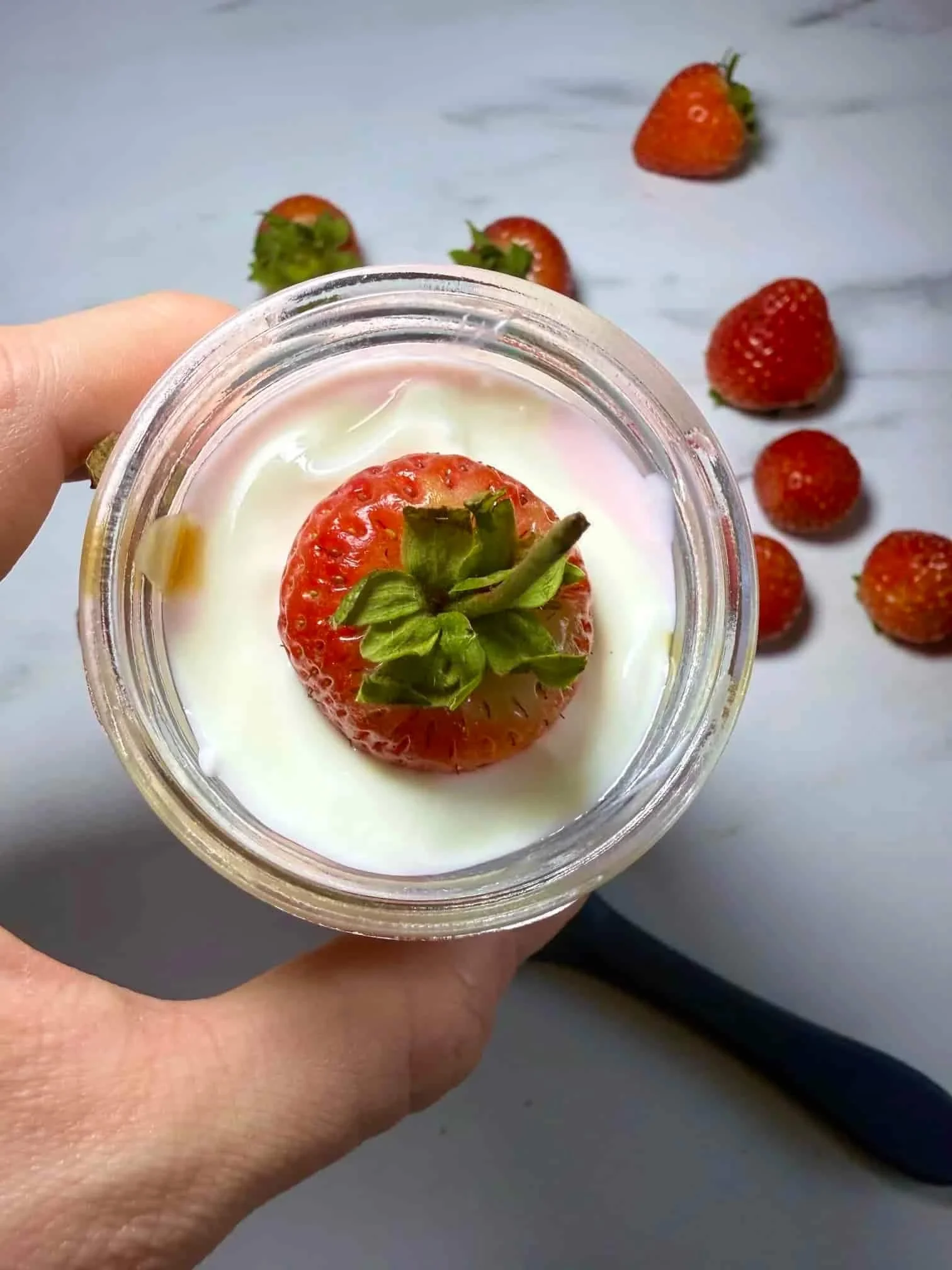





































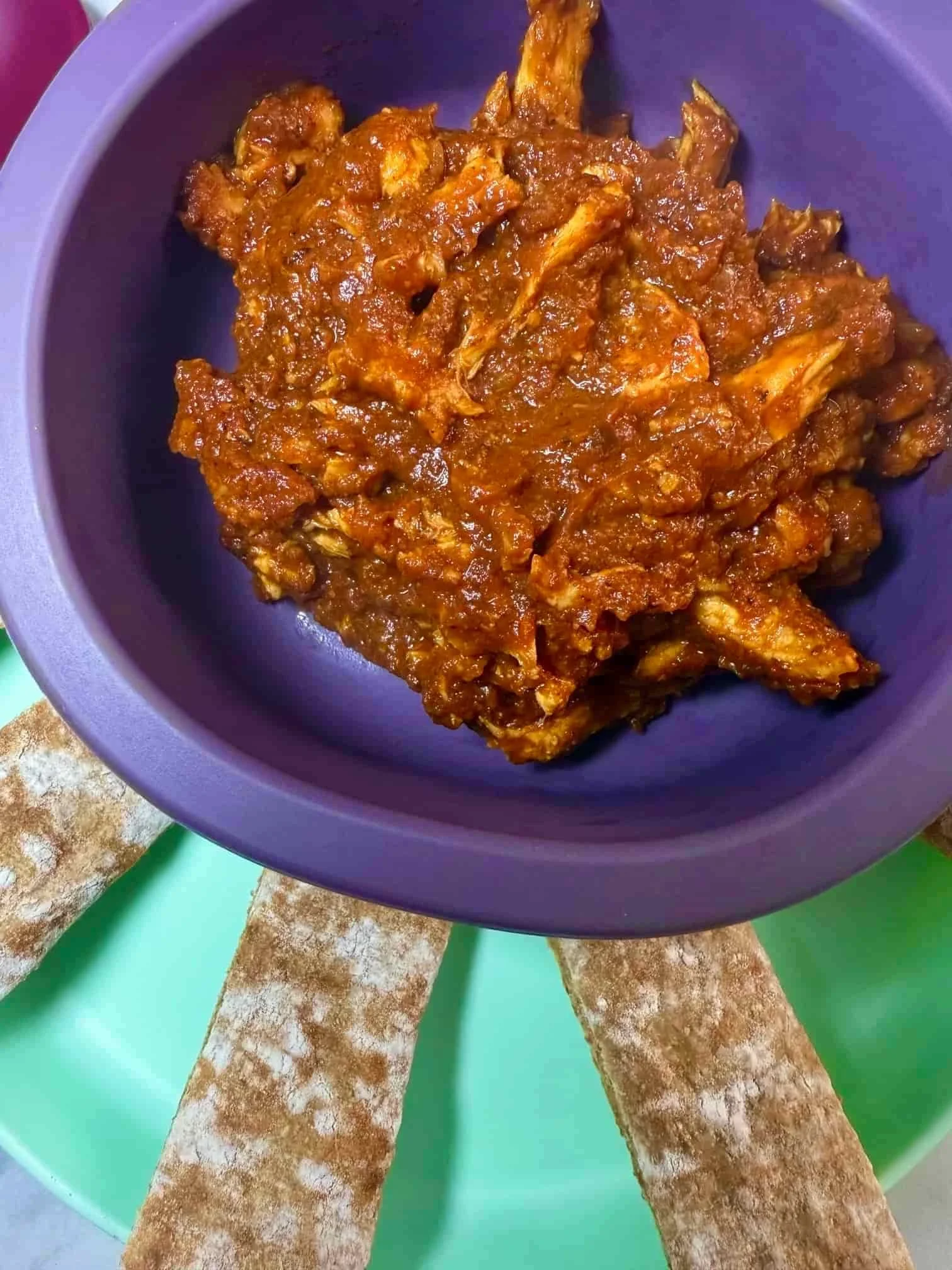

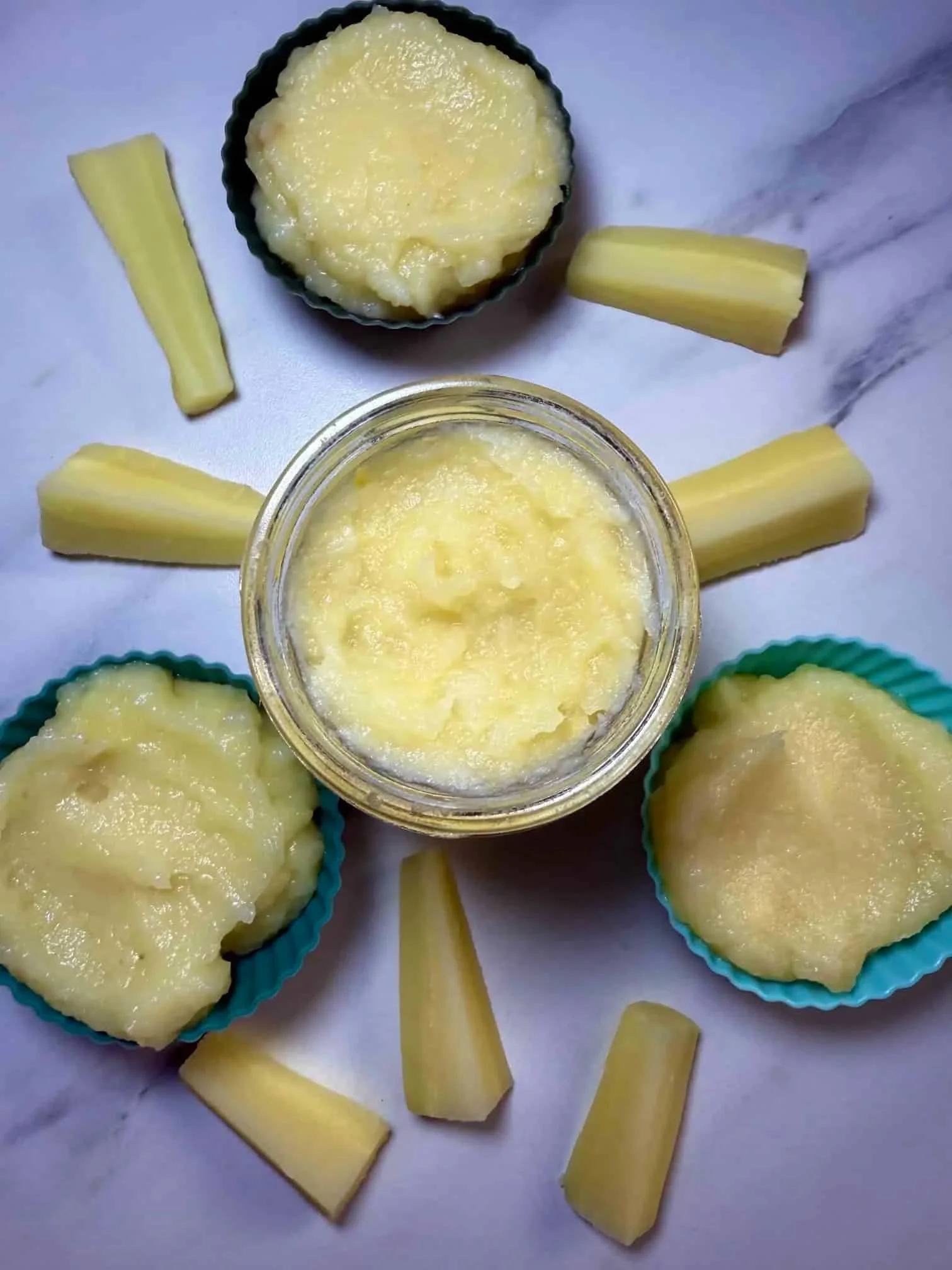




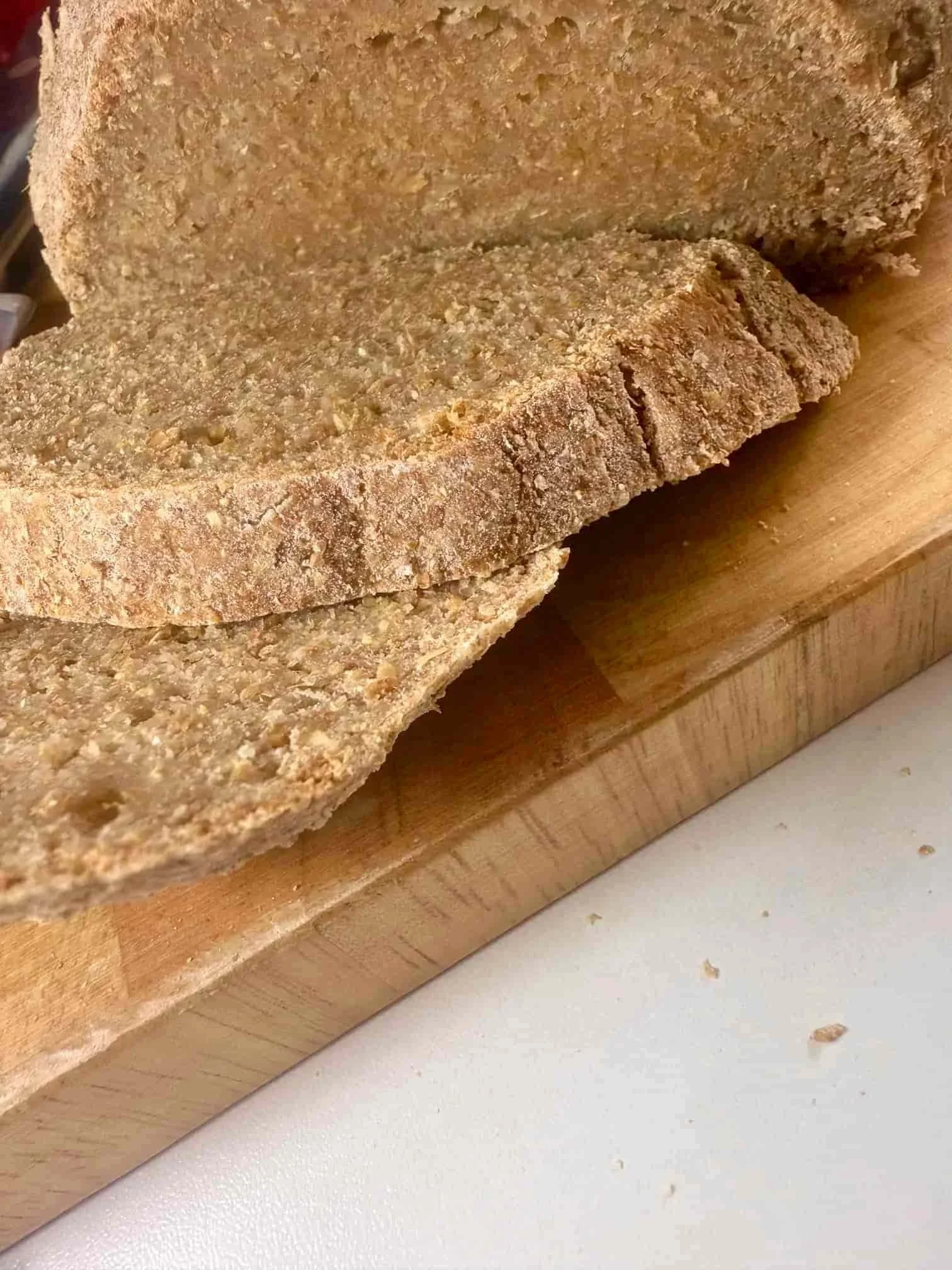




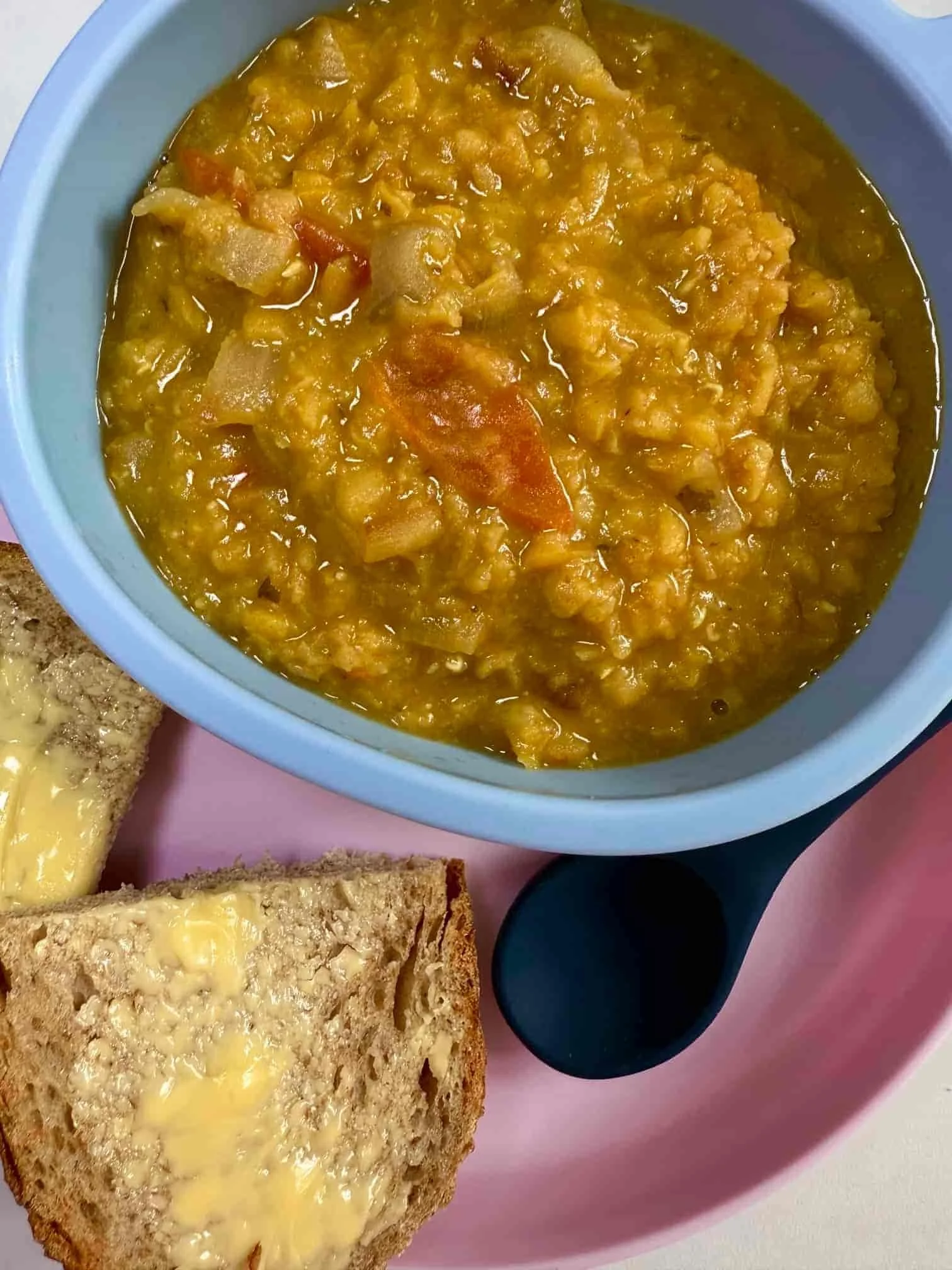











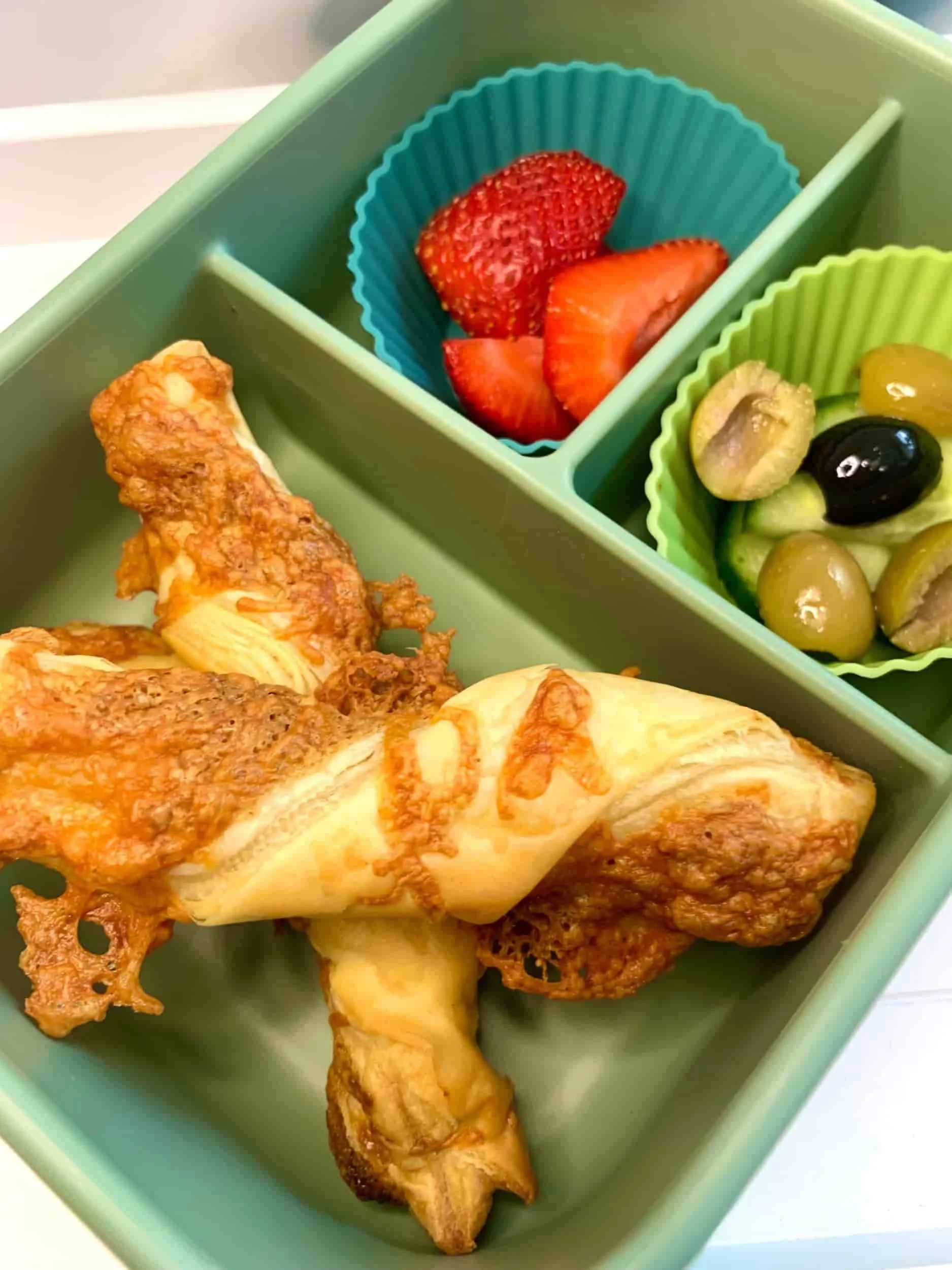




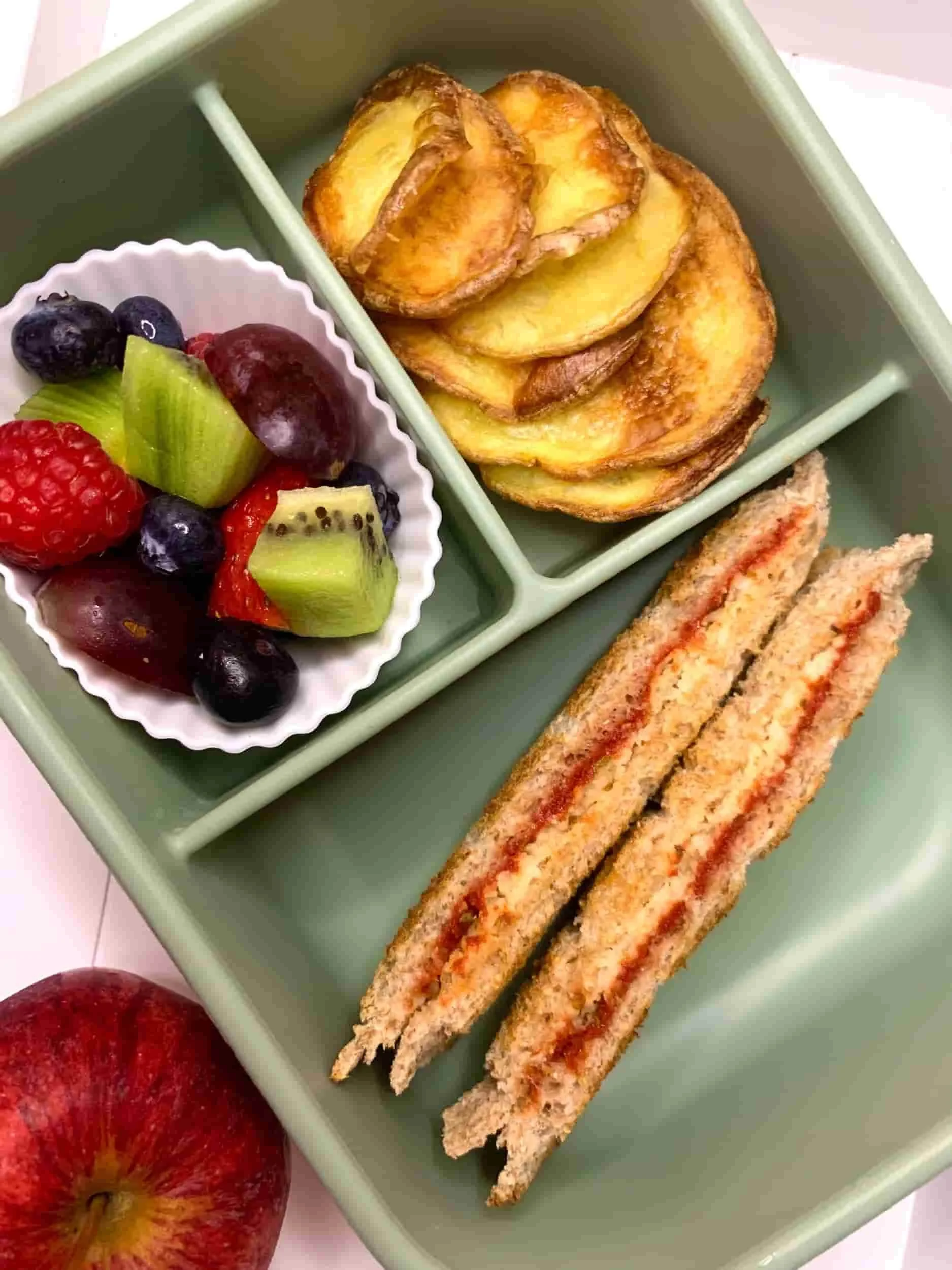
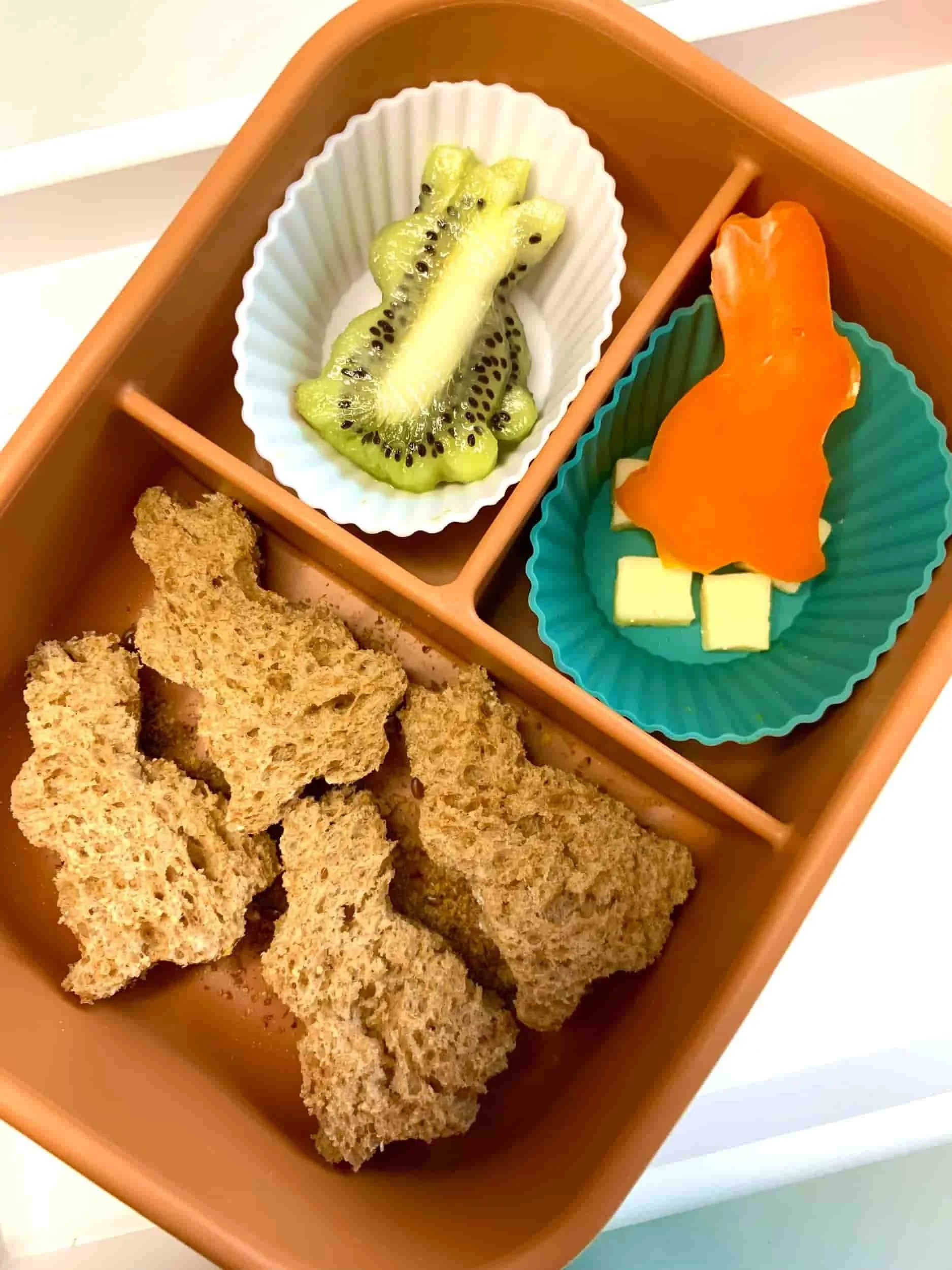
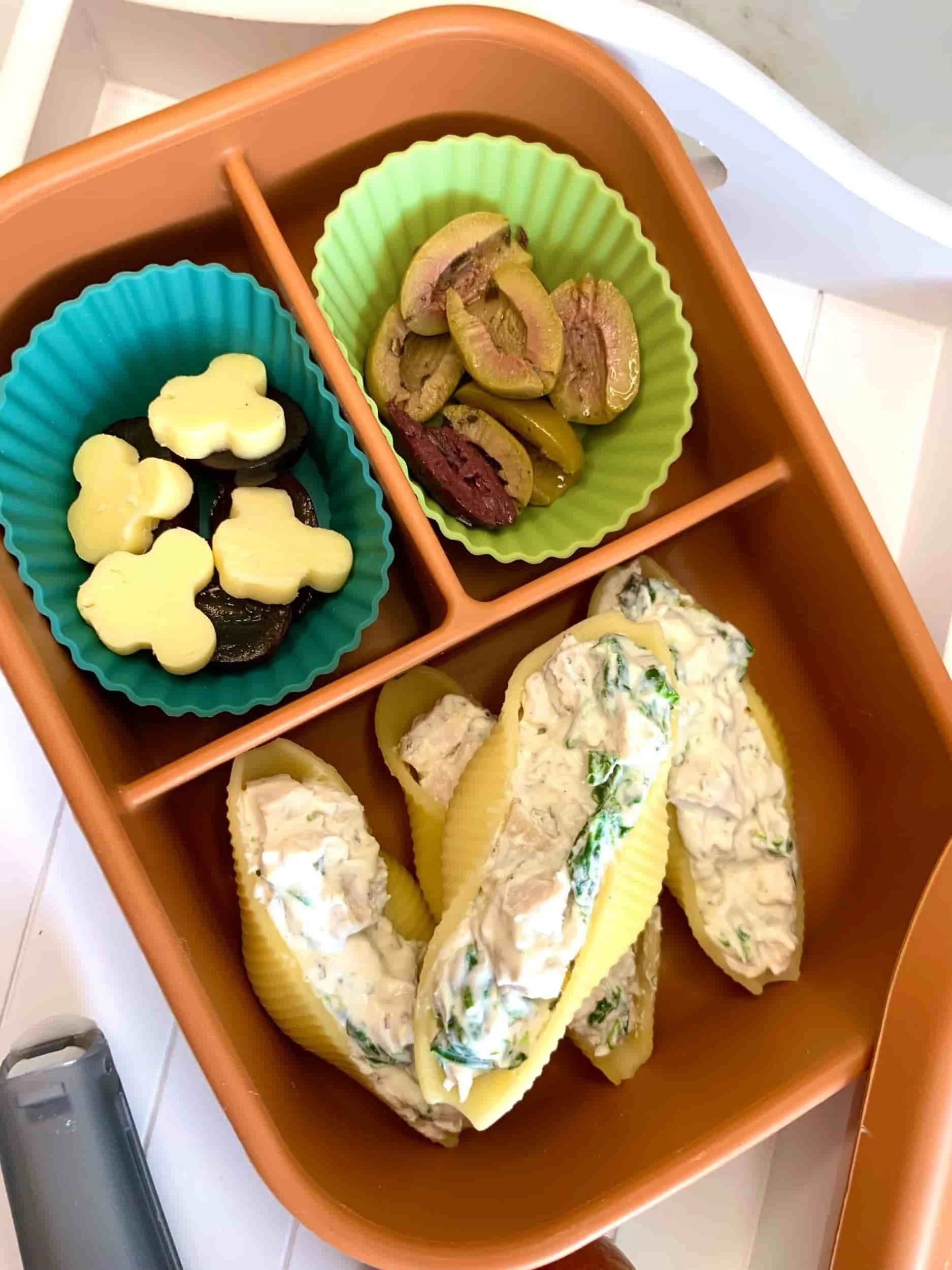

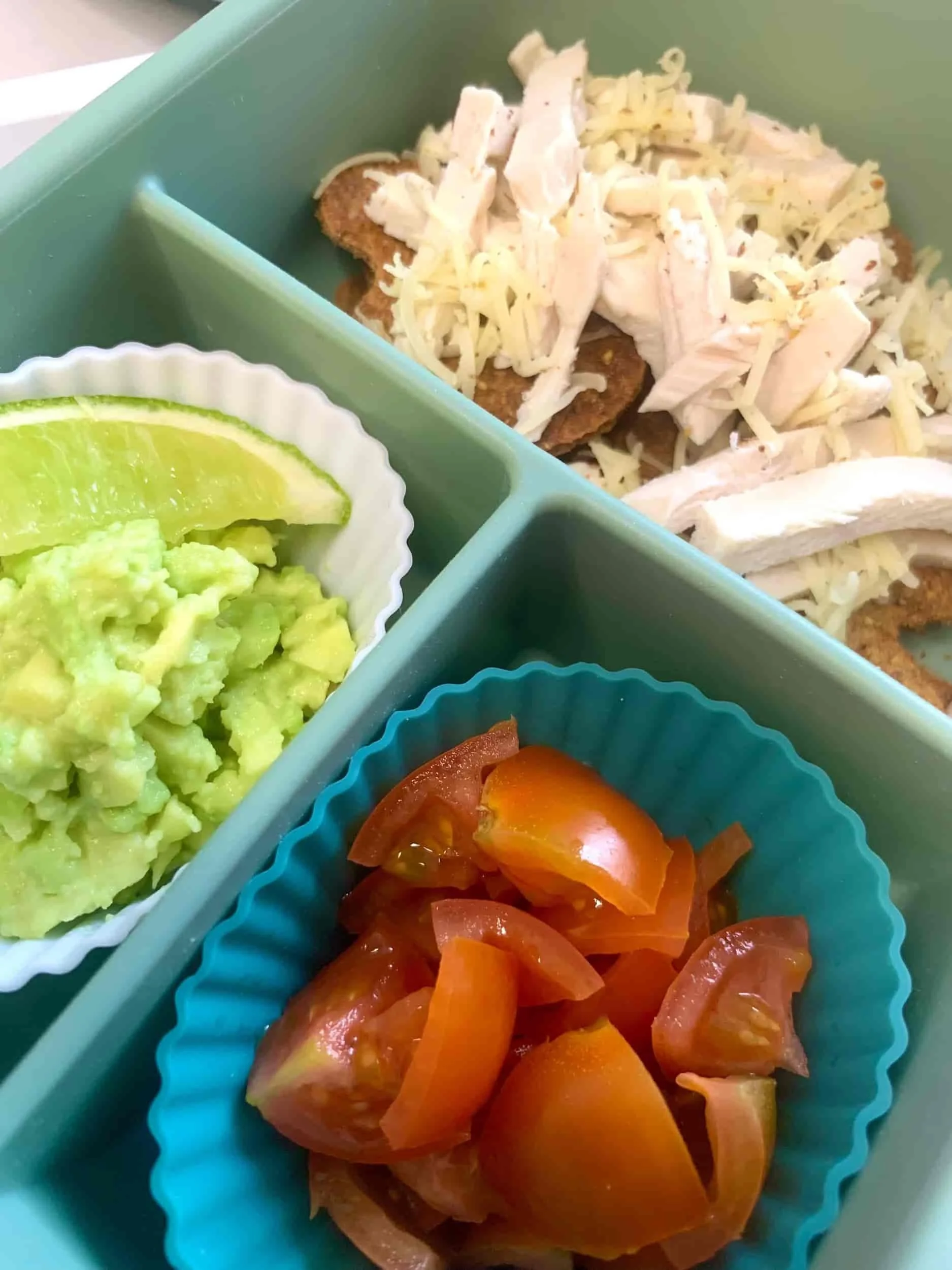



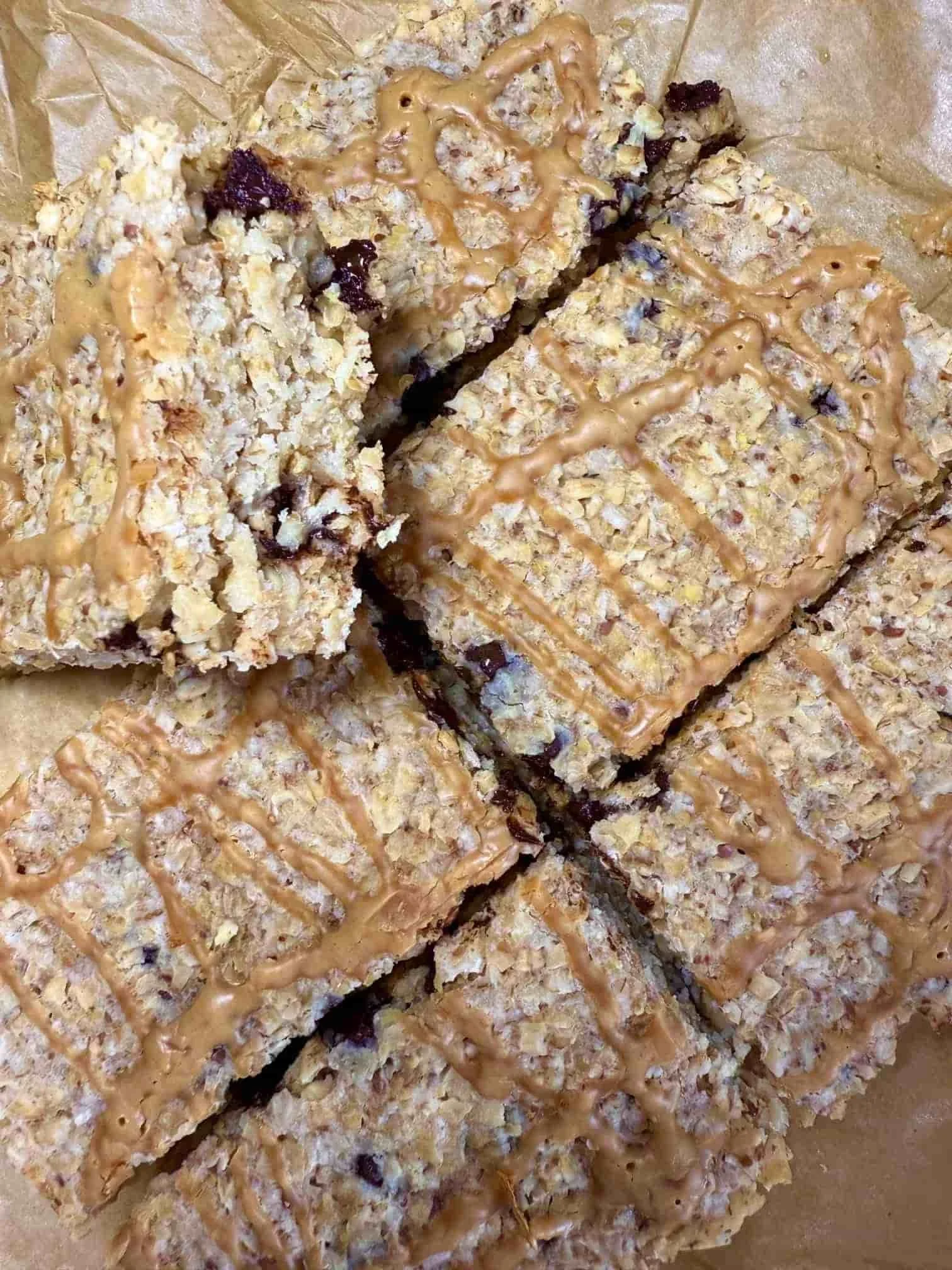

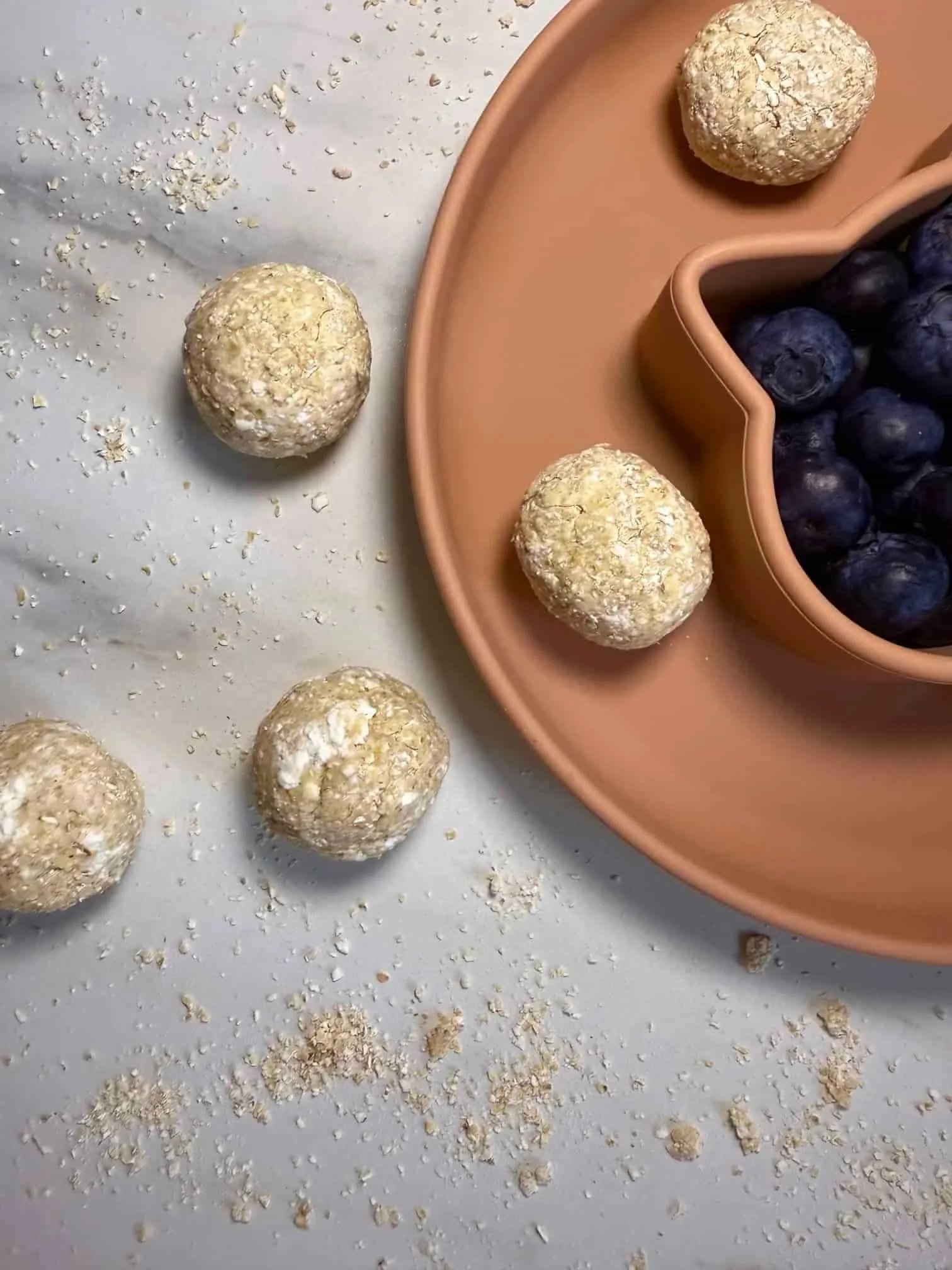
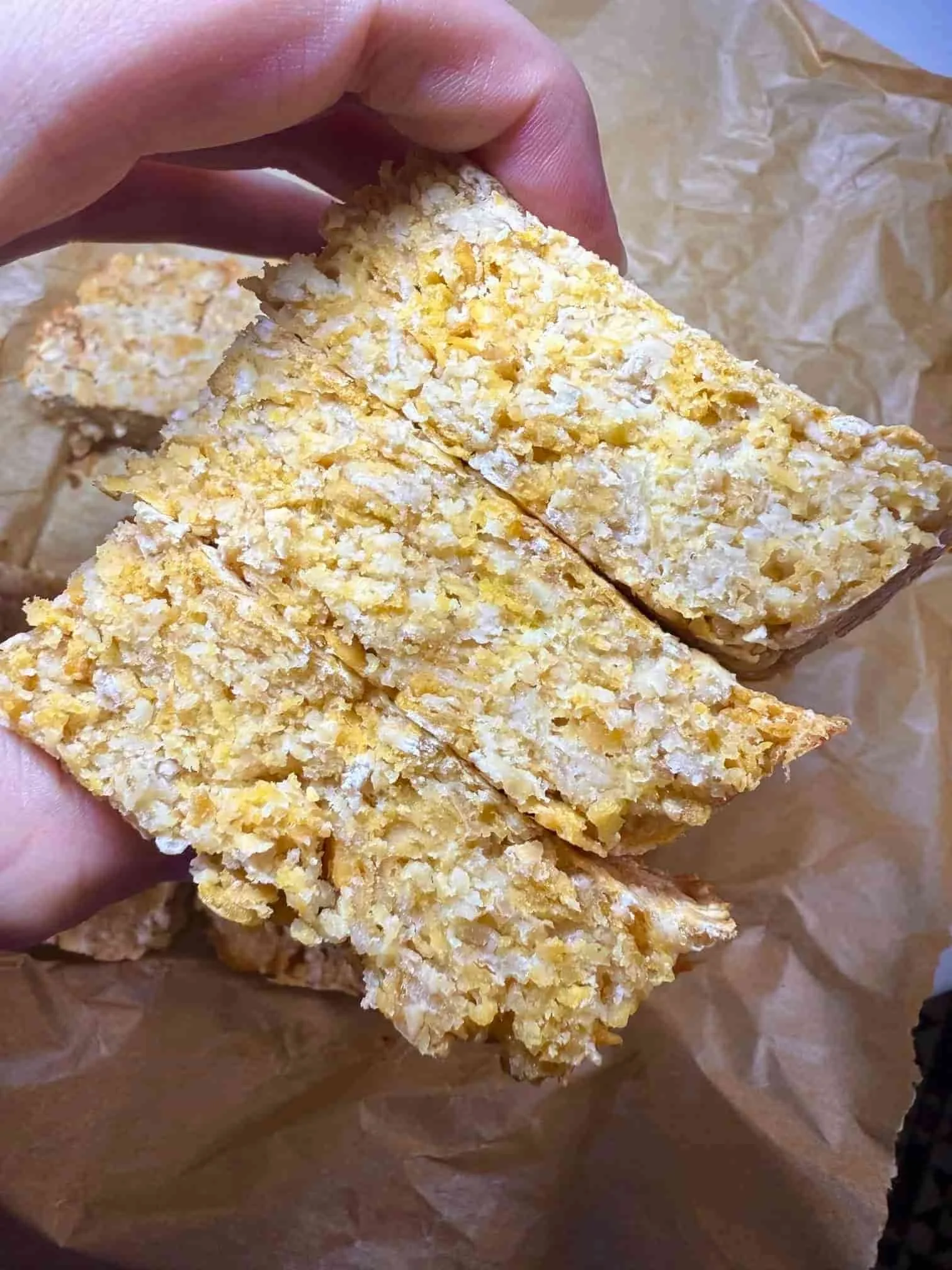




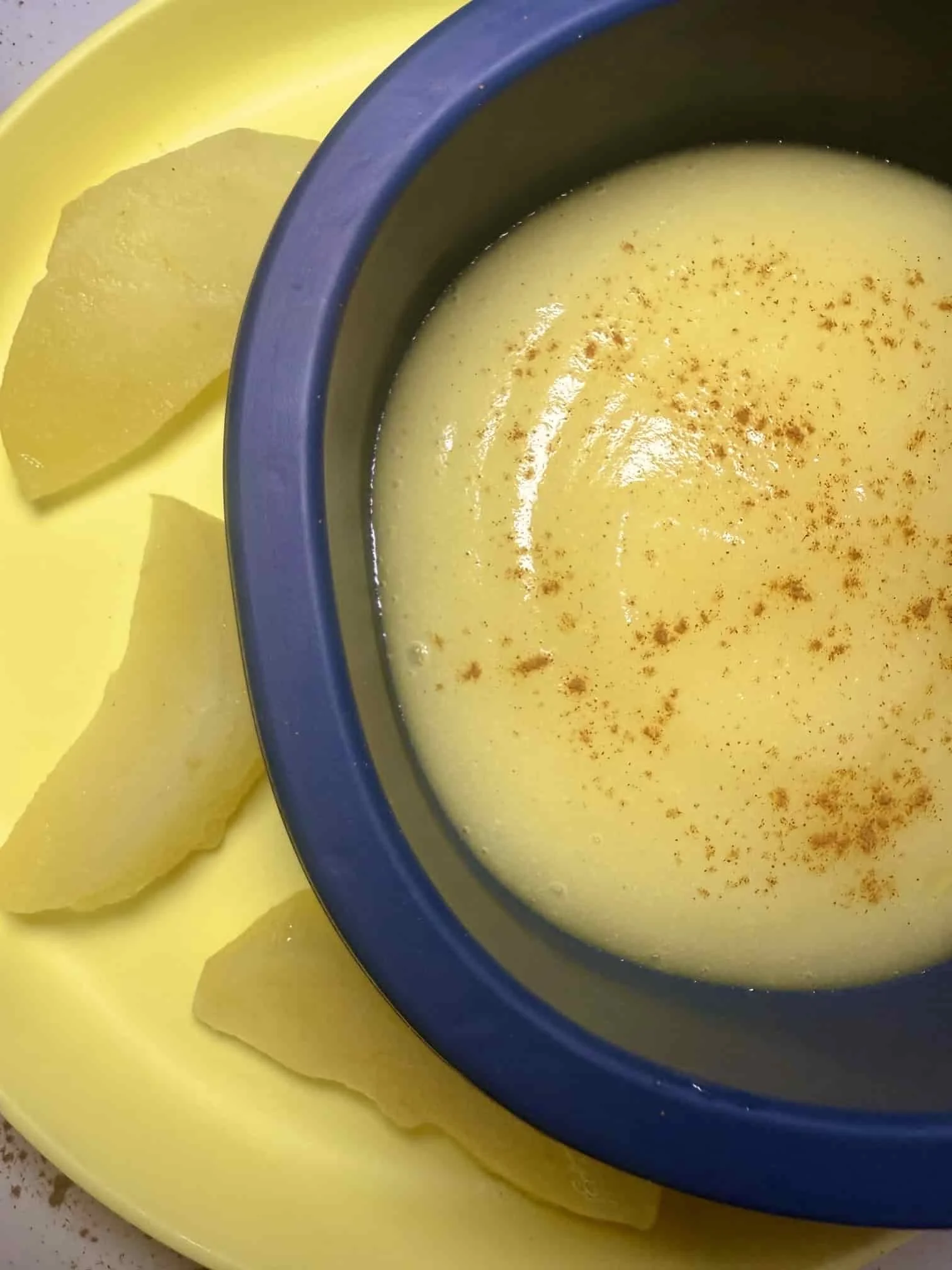
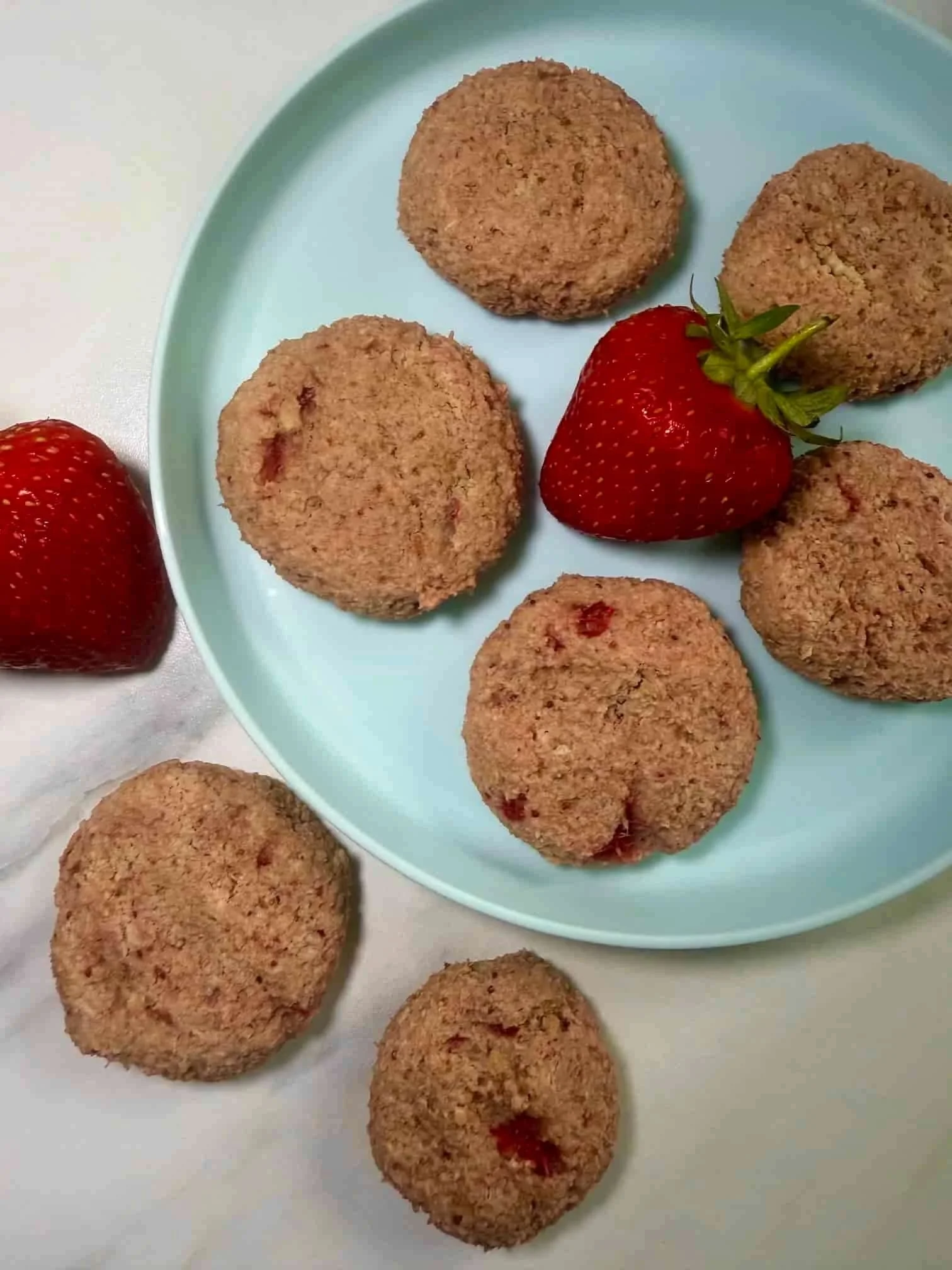
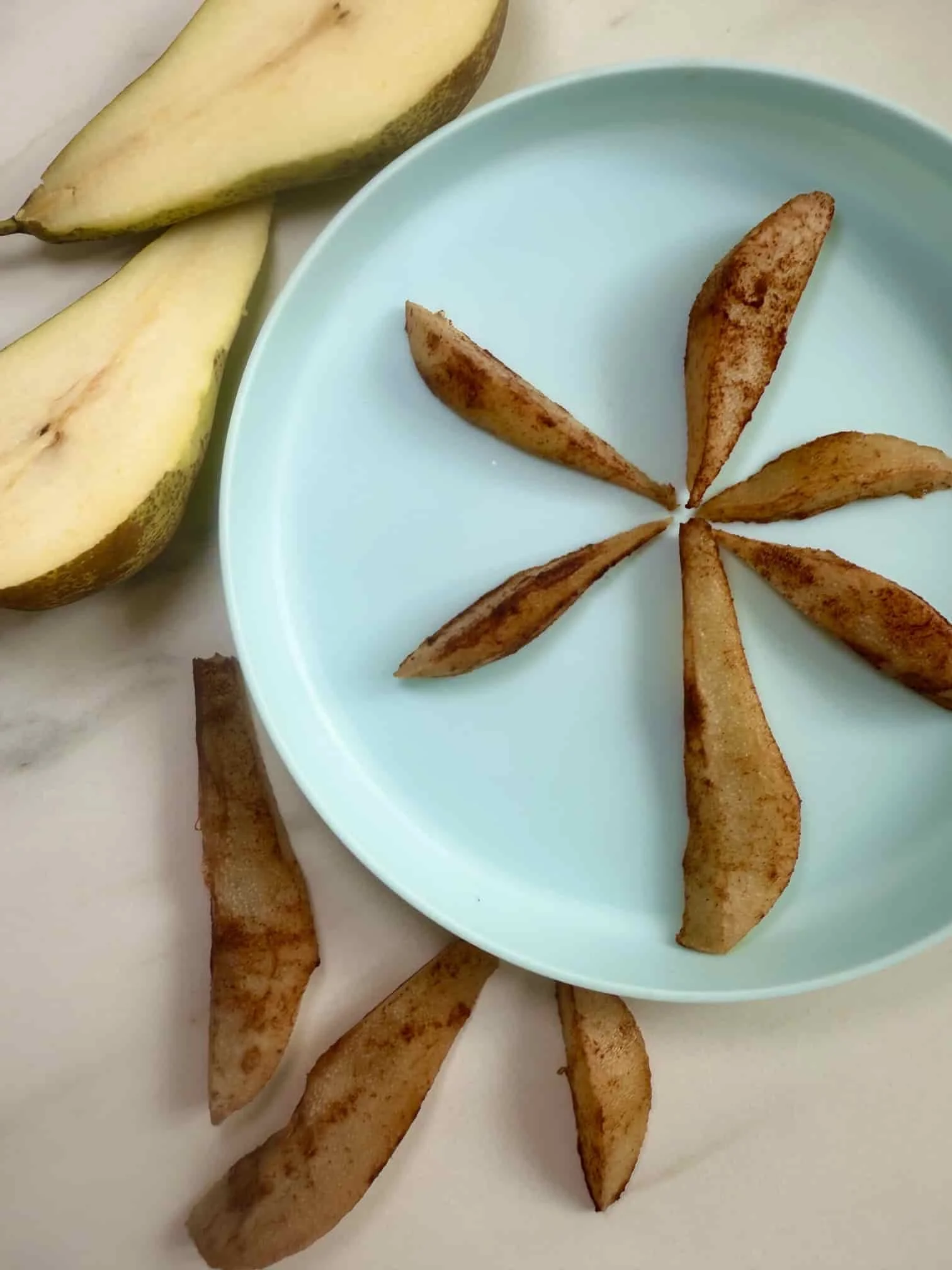


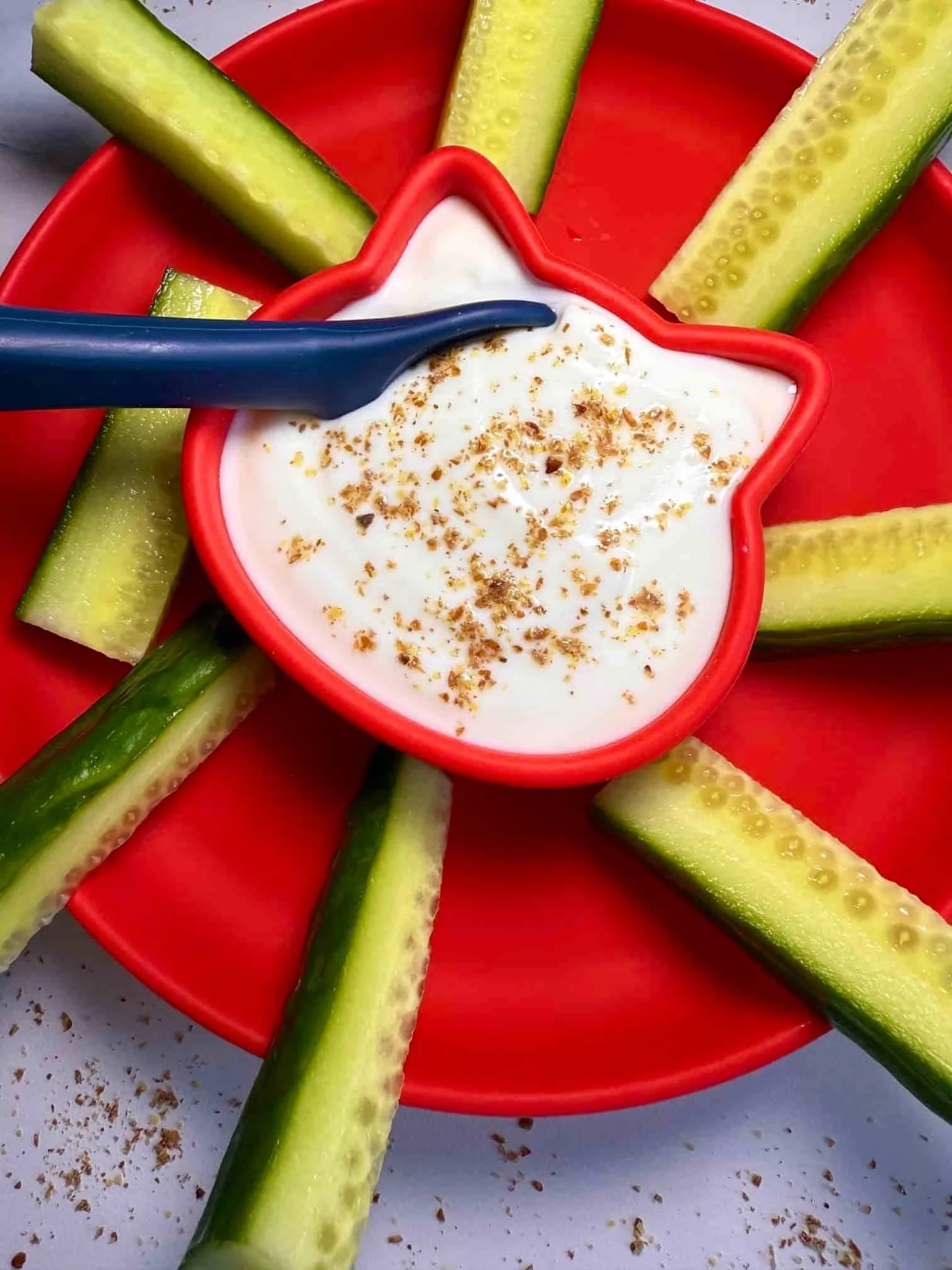
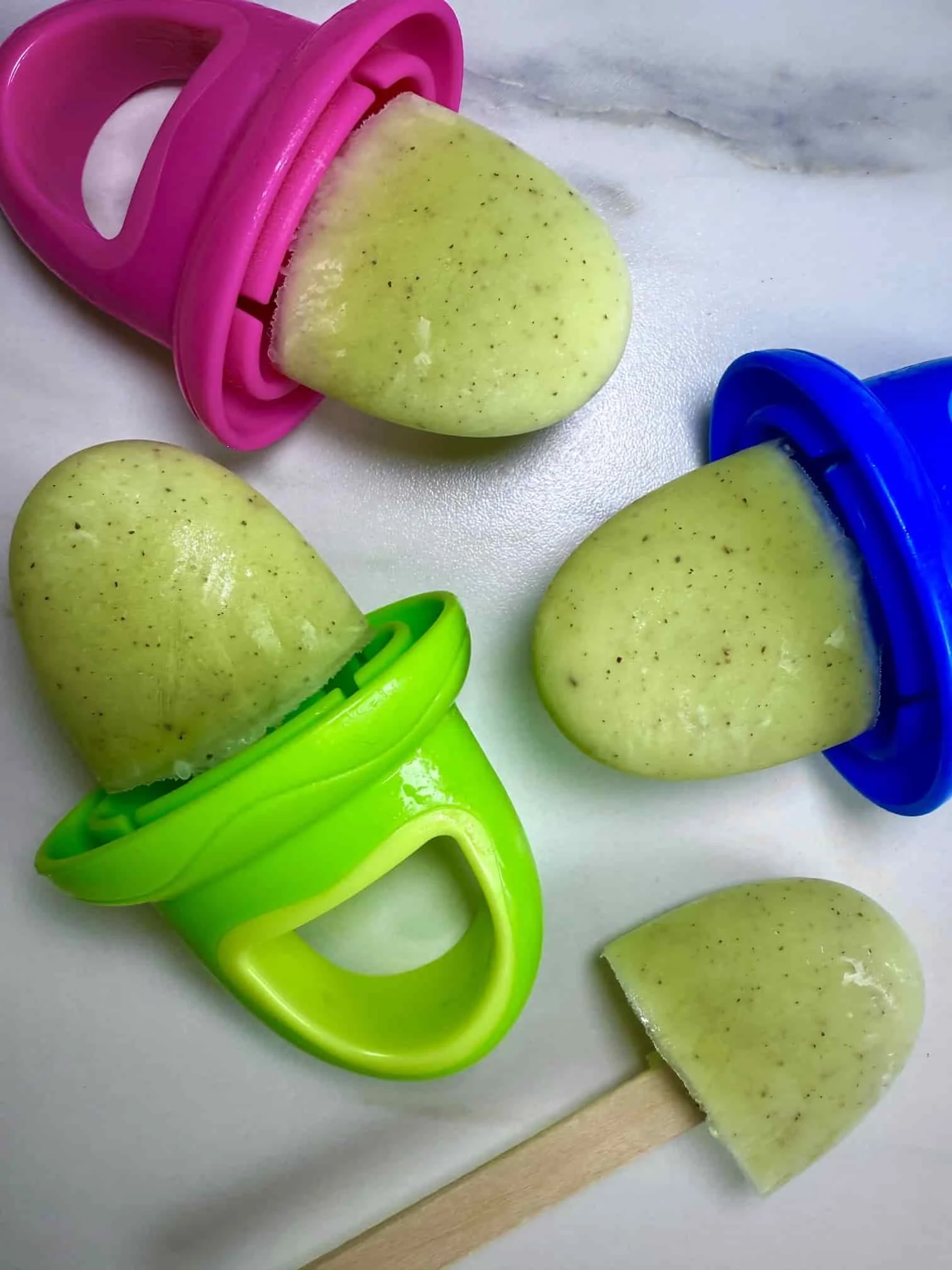
















Just 3 ingredients for this apple and oat smoothie that is great for baby, toddler and the whole family too. Mix it up for a quick snack or breakfast.